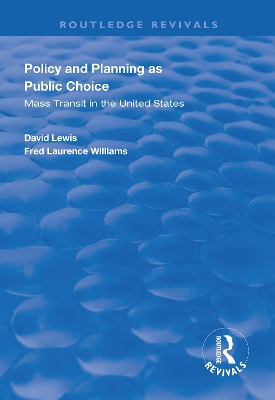Routledge Revivals
1 total work
Policy and Planning as Public Choice
by David Lewis and Fred Laurence Williams
First published in 1999, this book applies formal economic measures to the passenger and taxpayer benefits of public transit service in the United States under a public choice analytical framework. Approximately 400 local transit budgets have been renewed annually for more than 25 years. These budgets epitomize Braybrooke and Linblom’s concept of 'disjointed incrementalism' and Buchanan’s concept of 'Public Choice' since local legislators funded transit despite constant academic criticism of transit performance. On the other hand, Braybrooke and Lindblom and Buchanan show that local budgets capture benefits that traditional planning analysis does not grasp. This is borne out in analysis in the book. Indeed, far from draining society, transit returns five dollars in benefits for each one dollar of public subsidy. After explaining the analytical framework in Chapter 1, four chapters are devoted to measuring the value of transit benefits. The concluding chapter draws out the implications of this approach and of benefit measurement for policy and planning.
